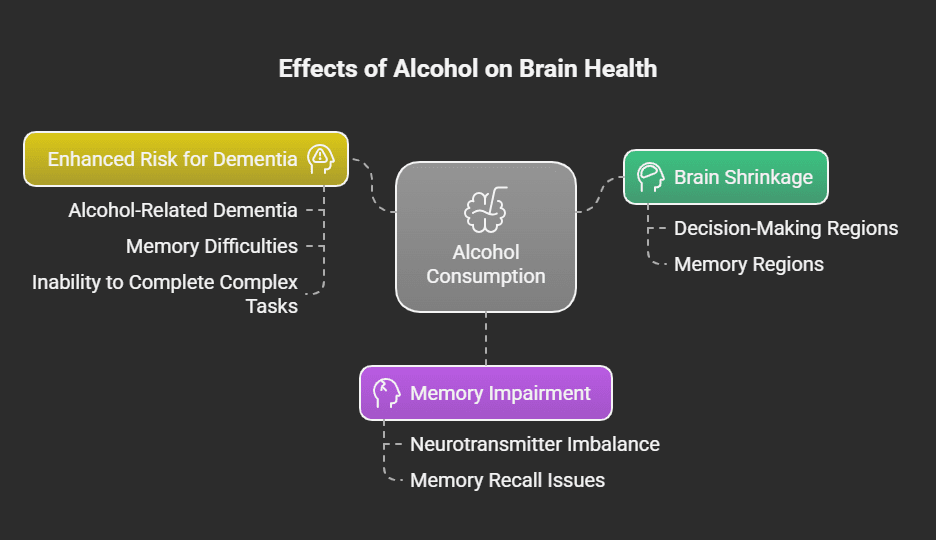Ensuring long-term brain health is important to live an independent and satisfied life. There are some habits, though, which can make your brain older earlier, cause you to forget, impair your judgment, and increase your risk of developing dementia. Throughout this article, we will find out about how high alcohol consumption, smoking, high consumption of sugar, and sleeplessness impact brain well-being. Understanding them will make it easier for you to decide intelligently to shield your brain properly.
The Effects of Excessive Drinking on Cognitive Function
Excessive drinking has a deep impact on the brain. Even moderate drinking, more than eight drinks a week, can raise the risk of brain lesions by 133%, which are linked to cognitive impairment and Alzheimer’s disease.
How Alcohol Harms the Brain

- Brain Shrinkage: Long-term alcohol consumption decreases brain volume, especially in regions involved in decision-making and memory.
- Memory Impairment: Alcohol interferes with neurotransmitter balance, disrupting memory development and recall.
- Enhanced Risk for Dementia: Chronic alcohol use is associated with an increased risk of developing dementia, including alcohol-related dementia with symptoms of memory difficulties and an inability to complete complex tasks.
Mitigating the Risks
To safeguard your cognitive well-being, alcohol consumption should be kept to a minimum. Dieticians suggest that one drink a day for women and two for men is acceptable. Alcohol intake should be cut back to avoid neurodamage and the loss of brain function.
Smoking: A Driver of Cognitive Decline
Smoking causes many toxins to enter the body, some of which are harmful to the brain. Smokers are 30% more likely to suffer from dementia than non-smokers
Effects of Smoking on the Brain
- Accelerated Cognitive Decline: Middle-aged male smokers undergo faster cognitive deterioration compared to non-smokers.
- Loss of Brain Volume: Smoking is linked to increased age-related brain volume reduction, impacting areas essential for memory and decision-making.
- Increased Risk of Stroke: Smokers are at higher risk of experiencing strokes, which have the potential to cause severe cognitive impairments.
Benefits of Quitting Smoking
The good news is that quitting smoking can reverse some of its harmful effects. Within five years of cessation, the risk of stroke decreases to that of a non-smoker. Additionally, quitting can lead to positive structural changes in the brain’s cortex, improving cognitive functions over time.
High Sugar Intake and Its Cognitive Consequences
Eating excessive sugar is not just unhealthy for the body but also extremely dangerous to brain health.
Sugar and Brain Function
- Memory and Learning Decline: Excessive sugar consumption has an inverse correlation with overall cognition, episodic memory, semantic memory, working memory, and perceptual speed.
- Increased Risk of Dementia: People in the top quintile for sugar intake have twice the likelihood of developing Alzheimer’s dementia as those in the bottom quintile.
- Neuroinflammation: Too much sugar can produce inflammation in the brain, upsetting normal neuronal functioning and leading to cognitive impairment.
Strategies to Reduce Sugar Consumption
To protect your cognitive health, try these
- Restrict Added Sugars: Pay attention to hidden sugars in processed foods and drinks.
- Select Whole Foods: Select natural sweet sources, such as fruits, that contain important nutrients and fiber.
- Read Labels: Read nutrition labels to track sugar levels in processed foods.
The Essential Function of Sleep for Cognitive Health
Proper sleep is essential for memory consolidation, emotional regulation, and general cognitive function. Ongoing sleep deprivation can have drastic effects on brain health.
Cognitive Effects of Sleep Deprivation
- Memory Consolidation Disruption: Sleep is necessary for the transfer and consolidation of memories. Sleep loss interferes with this process, causing forgetfulness and learning problems
- Increased Risk of Alzheimer’s: Poor quality sleep has been linked to increased risk for Alzheimer’s disease through the buildup of beta-amyloid brain proteins.
- Emotional Instability: Sleep deprivation impacts the amygdala, resulting in increased emotional reactivity, mood fluctuations, and greater stress.
Improving Sleep Quality
To enhance sleep and safeguard cognitive health:
- Use a Regular Sleep Routine: Sleep and rise at the same time every day.
- Establish a Comfortable Sleeping Environment: Make your bedroom quiet, dark, and cool.
- Have Limited Screen Time Before Bed: Steer clear of electronic devices at least one hour before bedtime to limit blue light exposure.
- Steer Clear of Stimulants: Avoid the use of caffeine or nicotine near bedtime.
Conclusion
Cognitive health in the long term is determined by everyday habits. Excessive drinking, smoking, excessive sugar consumption, and sleep deprivation are major risk factors for cognitive impairment and dementia. By adopting mindful lifestyle modifications, like controlling alcohol consumption, stopping smoking, limiting sugar intake, and focusing on quality sleep, you can safeguard your brain health and improve your quality of life.








